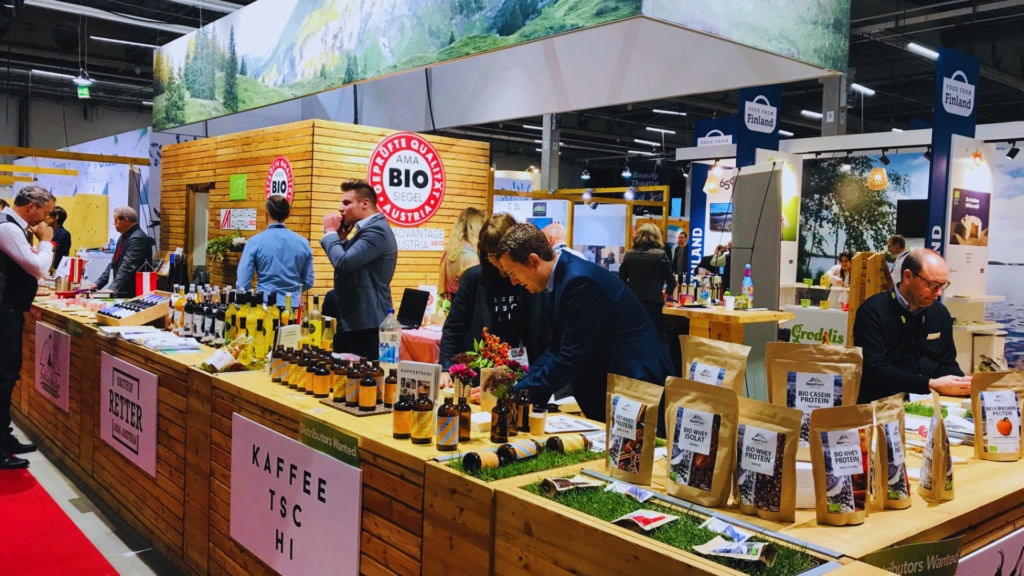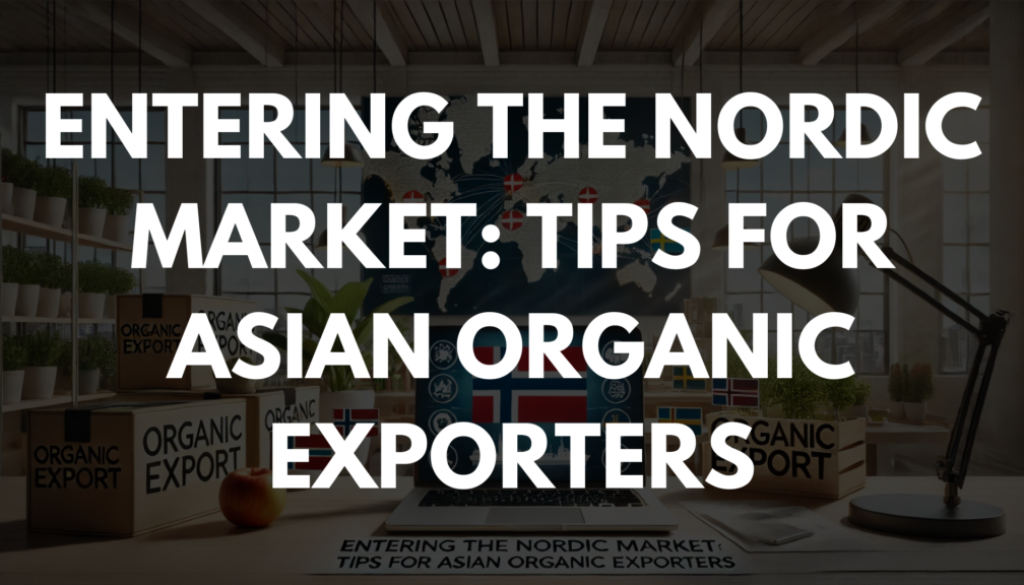Entering the Nordic Market: Tips for Asian Organic Exporters
Last Updated on 16. Dec 2024 by b2bexport
In recent years, the Nordic countries have become an attractive market for exporting organic products, especially from Asia.
With a rising interest in health, wellness, and sustainability, the demand for organic products in Denmark, Sweden, Norway, and Finland has been steadily growing. This presents a unique opportunity for Asian businesses to expand their reach and enter new markets. In this blog post, we will explore why the Nordic markets offer great potential for Asian organic product exports and discuss strategies for success in this market.
Background on the Rise of Organic Products
The surge in organic products has been a notable trend in recent years.
“Organic” refers to foods and agricultural products grown without synthetic fertilizers, pesticides, or GMOs.
- Health and Environmental Awareness: One key driver of this growth is increasing consumer awareness of the health and environmental benefits of organic food.Organic products are perceived as healthier due to their lower levels of harmful chemicals and higher levels of beneficial nutrients like vitamins and antioxidants.
- Sustainability Concerns: Growing concern about the environmental impact of conventional farming practices also fuels the demand for organic products.Organic farming is often viewed as more sustainable, using less water and energy, and producing less pollution compared to traditional methods.
Additionally, the expansion of organic products is bolstered by government regulations and certifications that ensure their authenticity and quality.
For instance, in the United States, the Department of Agriculture’s National Organic Program sets standards for organic food production and requires certification by accredited agencies.

Growth of Organic Products in the Nordic Markets
The demand for organic products has surged in the Nordic markets in recent years, driven by increasing consumer awareness of health and environmental benefits, strong government support for organic agriculture, and a preference for locally produced, sustainable foods.
Organic food production in the region has seen a notable rise, contributing to the growing availability of organic foods. A report by the Research Institute of Organic Agriculture highlights that Denmark, Sweden, and Finland are among the top ten countries globally for per capita consumption of organic food products.
In 2020, Denmark led with 14% of total food sales from organic products, followed by Sweden and Finland with rates of 10.4% and 9.7%, respectively, in 2019.
The Nordic markets present lucrative opportunities for Asian organic product exporters. Nordic consumers, known for their high purchasing power, are willing to pay a premium for certified organic goods.
The region’s strong commitment to sustainability and ethical practices makes it an attractive partner for organic producers worldwide.
Quick Facts about the Nordic Markets
- Countries: Denmark, Finland, Norway, and Sweden
- Population: Approximately 27 million
- GDP: Around $1.6 trillion
The organic food and beverage market in the Nordic countries is valued at about $4 billion and is projected to grow at a CAGR of 10.1% from 2020 to 2025, according to Mordor Intelligence.
Denmark, Sweden, and Norway are the largest markets, with Finland also seeing significant growth in organic food production. Nordic consumers are highly educated, environmentally conscious, and health-focused. They value quality, authenticity, and transparency in their food products and are willing to pay more for organic, locally produced, and sustainable options.
Euromonitor International reports that Nordic consumers are increasingly interested in plant-based diets, alternative protein sources, and functional foods and beverages that offer health benefits beyond basic nutrition.
The region’s high digital connectivity further enhances opportunities for online product research and marketing.
Health and Environmental Benefits
The shift towards organic food in the Nordic countries is largely driven by the perceived health benefits.
Organic farming practices, which avoid synthetic pesticides and fertilizers, are believed to produce healthier food crops with higher nutritional value. Consumers are also concerned about the long-term effects of conventional food consumption on human health.
Environmental Impact
Organic farming is praised for its positive impact on the environment.
By avoiding synthetic fertilizers and pesticides, organic methods help maintain soil fertility and reduce pollution. Organic agriculture practices, such as the use of green manure and natural pesticides, support the conservation of natural resources and improve soil quality.
Consumer Preferences and Market Trends
Nordic consumers prefer fresh produce and are increasingly attentive to food labels.
The presence of the USDA Organic Seal or other organic certifications on products assures them of the authenticity and quality of the organic food products. They tend to avoid processed foods and opt for items that promote animal welfare, such as free-range and humane treatment of animals.
Opportunities for Exporters
The growing demand for organic products in the Nordic markets opens up significant opportunities for exporters.
Products that meet organic standards and offer measurable benefits to public health and the environment are likely to succeed. Farmers markets and grocery stores in the region are actively seeking new organic offerings, including dairy products, organic meat, and organic crops.
Challenges and Considerations
Despite the growth, challenges remain.
The costs associated with organic certification and adherence to stringent organic standards can be prohibitive for some producers. Additionally, the logistics of transporting fresh produce over large distances while maintaining its quality pose significant challenges. The Nordic markets present a thriving opportunity for organic food producers and exporters.
By understanding the unique preferences and values of Nordic consumers, businesses can effectively tap into this lucrative market, contributing to a healthier population and a more sustainable environment.
Background on the Surge of Organic Products in the Nordics
The rise of organic products in the Nordic region is driven by several distinct factors:
Health and Environmental Awareness
Nordic consumers are becoming increasingly aware of the health and environmental implications of their food choices.
Organic foods, seen as healthier and more sustainable, are free from synthetic pesticides and fertilizers and are produced using environmentally friendly farming methods. This shift towards organic food products reflects a growing concern for both human health and environmental health.
Government Support
Nordic governments strongly support organic agriculture, promoting policies that enhance market growth.
For instance, Denmark targets 60% organic food consumption in public institutions by 2030, while Sweden aims for 30% of its agricultural land to be organic by the same year. This governmental backing is crucial in driving the adoption of organic farming practices and increasing the production of organic crops.
Increased Availability and Variety
The variety and availability of organic products have grown considerably.
Retailers and producers are meeting this rising demand, with major supermarket chains offering diverse organic selections. Additionally, there has been an increase in small, local producers selling at farmers’ markets and online.
Consumers can now find a wide range of organic produce, including fruits, vegetables, dairy products, and organic meat.
Willingness to Pay a Premium
Nordic consumers are willing to pay higher prices for organic products, encouraging more producers to invest in organic farming and certification.
According to the Research Institute of Organic Agriculture, organic products in the Nordics are typically priced 30-50% higher than conventional food. This willingness to pay a premium is a significant factor driving the growth of the organic market.
Organic Standards and Certification
Certified organic products adhere to strict standards that prohibit the use of synthetic pesticides, synthetic fertilizers, and genetically modified organisms.
Organic certification ensures that products meet these standards, providing consumers with confidence in their food choices. The USDA organic seal is one such certification that guarantees compliance with organic standards.
Focus on Sustainable Farming Practices
Organic farming emphasizes the use of natural resources and sustainable practices to maintain soil fertility and quality.
Techniques such as green manure, crop rotation, and the use of natural pesticides help increase soil fertility and promote healthy soil quality. These practices contribute to the overall sustainability of organic food production.
Consumer Behavior and Market Trends
The trend towards organic food is also driven by consumers’ desire for transparency and trust in their food sources.
Many consumers read food labels carefully to ensure they are choosing organic products. There is a growing demand for organic methods of production that promote animal welfare and humane treatment, including free-range and humane treatment practices for animal products. Overall, the surge in organic products in the Nordics reflects a broader trend towards healthier and more sustainable food choices. The unique combination of consumer preferences, government backing, and market response positions the Nordic region as a leader in the organic movement.
This movement not only benefits human health but also supports environmental health by reducing the reliance on harmful chemicals and promoting the use of natural farming methods.
Conclusion
The growth of organic products in the Nordic markets represents a dynamic shift towards healthier and more sustainable food consumption.
Driven by increasing health and environmental awareness, robust government support, a broader range of available organic food products, and a willingness to pay premium prices, the Nordic region has established itself as a leader in organic food production. Denmark, Sweden, Finland, and Norway showcase high per capita consumption of organic foods and present a lucrative opportunity for exporters, particularly from Asia. With the Nordic consumers’ strong purchasing power and commitment to sustainability, the market offers a fertile ground for expanding organic produce offerings.
For Asian exporters, understanding the unique drivers of this market and aligning with its values of health, sustainability, and quality can lead to successful market entry and growth.
As the demand for certified organic products continues to rise, the Nordic markets stand out as a promising destination for businesses committed to delivering organic excellence. As the organic farming practices and certified organic standards continue to evolve, the benefits of organic agriculture become increasingly apparent.
The use of natural pesticides, synthetic fertilizers alternatives, and humane treatment of animals contribute to environmental health and human health.
The USDA organic seal ensures consumers that the organic products meet strict guidelines, making it easier for them to choose healthier and environmentally friendly options. By promoting organic methods and maintaining high organic standards, the Nordic markets exemplify a sustainable and health-conscious approach to food consumption.
In conclusion, the Nordic markets not only highlight the measurable benefits of organic foods but also offer significant opportunities for growth and innovation in organic food production.





